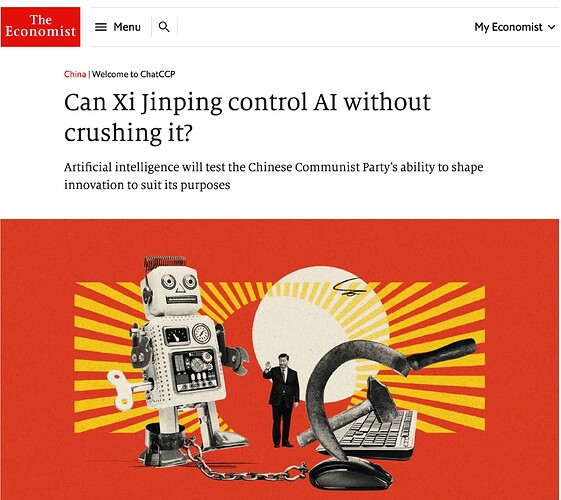-
中国的科技巨头一直在展示他们的人工智能(AI)模型,这些模型可以为图像生成器、语音助手和搜索引擎等产品和应用提供动力。人工智能给中国政府带来了挑战,因为它可以在其控制之外传播信息。中国网络空间管理局(CAC)提出了规范使用生成性人工智能的规则,对颠覆国家政权、煽动分裂、损害国家统一或扰乱经济或社会秩序的内容进行限制。
-
与其他国家相比,中国对人工智能的监管方式更加零散和反动。去年,中国互联网协会发布了关于 "深度造假 "图像和视频的规则,以防止破坏严格控制的信息环境。中国政府也在建立其官僚肌肉,并增加其监管工具箱,规定安全审查,并要求企业向国家注册其算法。
-
中国对互联网的控制并没有扼杀创新,然而,他们对人工智能的拟议规则可能会限制中国生成性人工智能的发展。CAC建议公司对这类工具产生的内容负责,并且必须保护用户的个人信息。这可能会导致公司在使用某些类型的个人数据时必须获得同意。中国证监会规则的任意性意味着它们可以在习近平主席认为合适的时候收紧或放宽。
-
中国有一个总体规划,到2030年成为人工智能领域的主导力量,但由于投资和创新落后于美国,以及对中国一些人工智能巨头的制裁,它的结果好坏参半。
-
中国正试图在2030年前成为人工智能伦理的领导者,其关于生成性人工智能的法规比其他地方建议的法规更加详细和宽泛。
-
西方政府应该关注中国正试图在人工智能伦理方面领先,因为他们对错误信息和数据保护有不同的做法。中国有压制言论自由的历史,在人工智能方面也可能这样做。
-
China’s tech giants have been showcasing their artificial intelligence (AI) models, which can power products and applications such as image generators, voice assistants and search engines. AI poses a challenge for the Chinese government, as it can spread information outside its control. The Cyberspace Administration of China (CAC) has proposed rules to regulate the use of generative AI with restrictions on content that subverts state power, incites secession, harms national unity or disturbs the economic or social order.
-
China’s approach to regulating AI is more piecemeal and reactionary compared to other countries. Last year, the CAC issued rules on “deepfake” images and videos to prevent disruption of the tightly controlled information environment. The Chinese government is also building up its bureaucratic muscles and adding to its regulatory toolkit, by mandating security reviews and requiring firms to register their algorithms with the state.
-
China’s control of the internet has not stifled innovation, however, their proposed rules on AI could limit the development of generative AI in China. The CAC has proposed that companies be responsible for the content generated by such tools, and must safeguard users’ personal information. This could lead to companies having to obtain consent to use certain types of personal data. The arbitrary nature of the CAC’s rules means they can be tightened or loosened as President Xi Jinping sees fit.
-
China has a Master Plan to be a dominating force in AI by 2030, but it has been met with mixed results due to investment and innovation being behind America and sanctions on some of China’s AI giants.
-
China is attempting to be the leader in AI ethics by 2030, and its regulations on generative AI are more detailed and expansive than those suggested elsewhere.
-
Western governments should be concerned that China is attempting to lead in AI ethics, as they have a different approach to misinformation and data protection. China has a history of oppressing free speech and could do the same with AI.
